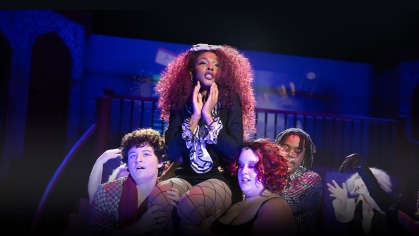Florida’s “Don’t Say Gay” Bill and Oscars Victories Demonstrate Mixed Opinions for LGBTQ Rights Movement
Rutgers–Camden experts weigh in on potential ramifications of the bill

April 7, 2022
By Alina O'Donnell
Last week, Florida passed the highly controversial “Don’t Say Gay” law, banning discussion of sexual orientation or gender identity in elementary school classrooms. This announcement came less than 48 hours after Ariana DeBose made history as the first Afro-Latina and openly queer woman to win an Academy Award for best supporting actress. Her acceptance speech offered encouragement to anyone navigating an identity conflict — one of several nods to the bill that night.
The dichotomy between this landmark moment for LGBTQ representation in Hollywood and the passage of The Parental Rights in Education bill demonstrates how progress has not unfolded equally across the country. The LGBTQ rights movement has gained strong momentum over the past decade — yielding the legalization of same-sex marriage, repeal of “Don’t Ask, Don’t Tell” requirements in the military and emergence of transgender rights. Yet Lauren Silver, a professor of childhood studies at Rutgers–Camden, said this newest law is a direct threat to freedoms that activists have fought so hard to achieve.
“A bill like this [Don’t Say Gay] is absolutely shutting down and creating fear where students cannot be themselves, be out about their families or explore their history,” she said.

As a professor of transformative childhood studies, Silver’s research centers on the lives of young people who experience gendered and state violence and oppression. By restricting LGBTQ-related content and conversation — both in classroom teachings and informal interactions with peers — she said this law serves to silence and marginalize LGBTQ teachers and students, as well as children of queer parents.
“What we know already in terms of the mental health crisis among young people is that rates of suicide are way up,” said Silver. “This fear-based climate — where shame is attached to discussions of gender and sexual identity — forces kids and teachers to suffocate parts of themselves.”
Shauna Shames, a professor of political science at Rutgers–Camden and director of the Gender Studies program at Rutgers–Camden, said this development “stoked the fire” of an ongoing culture war against the LGBTQ community, waged through book bans, Pride flag removals and a wave of discriminatory legislation. At least 290 anti-LGBTQ bills were introduced across 33 states in 2021.
What’s important to note, said Shames, is that the LGBTQ rights movement has progressed at an astonishingly fast pace when compared to other American social movements. Rapid social and policy change, she said, often garner strong backlash — especially where public opinion lags behind.

“This was a media-driven opening up of the world,” said Shames, crediting influences like entertainer Ellen DeGeneres. “Politics do not lead culture; it’s the other way around. When you have a really successful social movement, it has to change both of those. If politics change first, that’s when you get a situation like Roe V. Wade. When people aren’t prepared, there’s a huge backlash.”
DeBose’s choice to use her moment onstage at the Academy Awards to make a political statement — as well as Wanda Sykes, Amy Schumer and Regina Hall’s thinly veiled jabs at the Florida law during their opening trialogue — are examples of how celebrities and public figures continue to pave the way for change. If their performances are any indication of what’s to come for “Don’t Say Gay,” Shames remains optimistic that this act of political posturing will do little more than propel activists to the polls.
“Politically, it is not very smart. And it’s not going to do what its proponents want it to do, which is to shield children from the information that there are gay people in the world. That cat is out of the bag,” she laughed, noting that today’s students have unprecedented access to information at their fingertips.
Silver advises those in positions of privilege and power — especially parents — to “speak out, step up and set the bar” in resistance. To achieve true acceptance, she said, we need to foster safe, inclusive spaces where difficult conversations can occur.
“As an educator, this is what we do in our classrooms every day,” she said. “We are challenging ourselves, in a loving environment, to take on new perspectives.”


